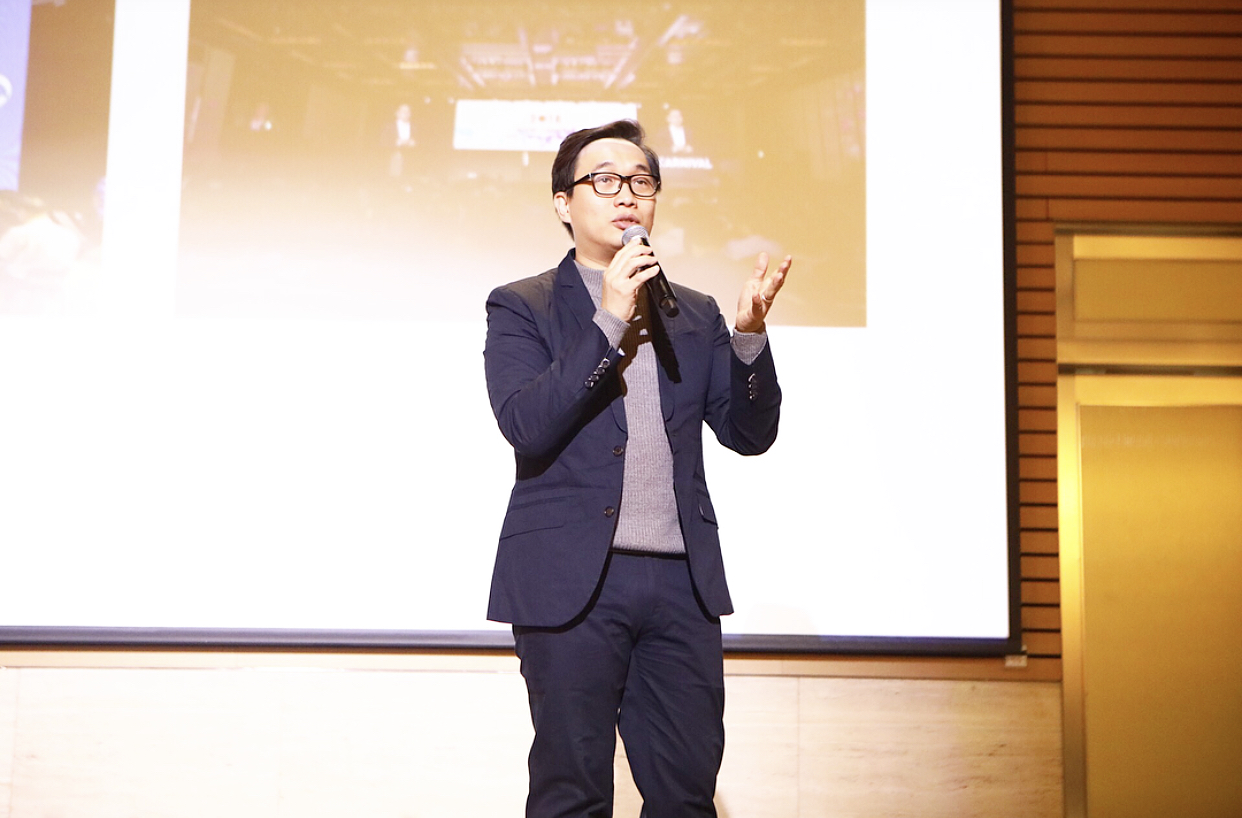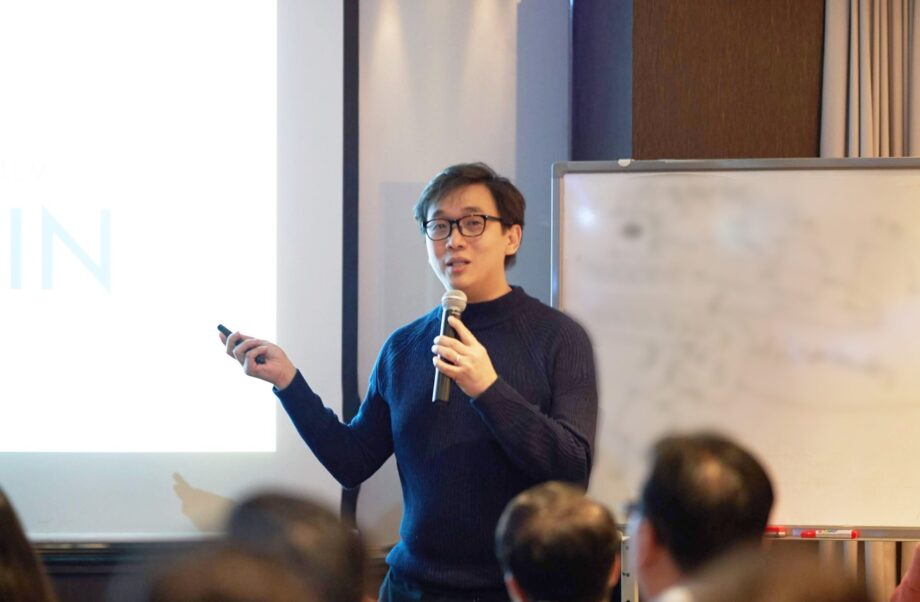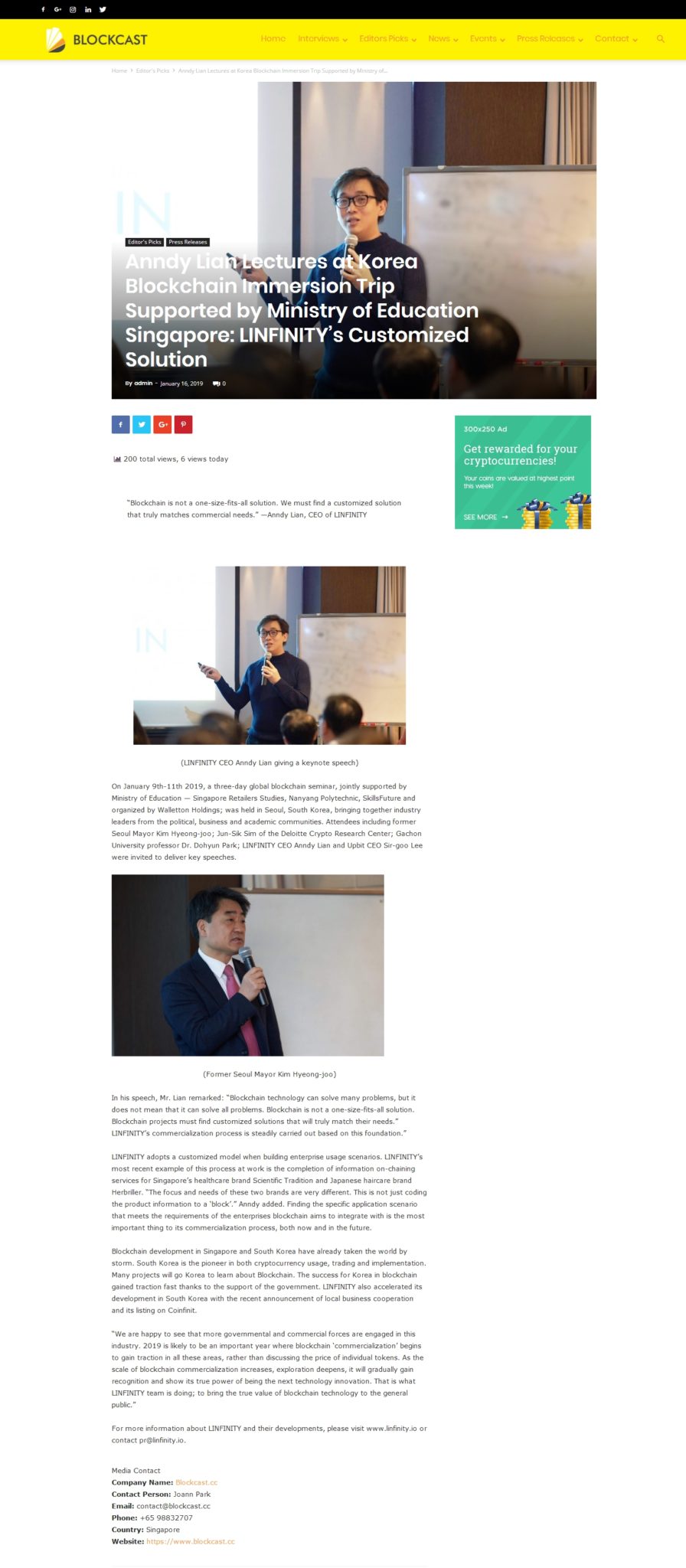With LINFINITY’s recent successes in developing their DApp supply-chain management system, and with a swathe of announcements, conference appearances, a website overhaul, and the signing of MOUs with big names in the healthcare industry including Herbriller and Scientific Tradition, the Singapore-based blockchain company, looks, as it always has, towards infinite possibilities beyond Asia.
INEFFICIENCIES, MISCOMMUNICATION AND UK SUPPLY CHAINS
The great difficulties of supply-chain management, especially for smaller businesses, lie in just how vast and complicated the system can become. In a small, import-export-based economy, these problems can quickly drain a significant amount of time, effort, and money from businesses as they expand. In the UK, supply chains are dominated by inefficiencies and miscommunications, costing businesses over £1.5bn per year.

30th August this year saw LINFINITY hold its first roundtable conference in London’s financial centre at Canary Wharf – the LINFINITY Forum – after a series of successful talks with key industry players in Singapore, South Korea and Japan. One can understand their reasoning for picking Britain as its first step towards international acclaim. “We wanted to make the UK our first stop outside of Asia due to the strong level of interest we received from parties within various industries in the UK over the past few months,” shared LINFINITY CEO Anndy Lian at the conference. “There is a considerable market for LINFINITY’s service offerings in the area of supply chain financing, and the LINFINITY Forum will aim to bridge that gap.”
Mr. Lian makes a good point. In terms of technological advancement, the UK has been at the forefront of innovation since the dawn of the Empire – being the first country to fully industrialise in the 17th century, and continuing the trend even today with an impressive command over goods shipping through the Channel and beyond. However, while technological advancements have increased the workload for traditional supply chains, and while logistical improvements have significantly sped up trade between mainland Europe and Britain, the financial and security aspects of supply-chain operations still rely on traditional, boots-to-ground and paper-based processes, with an alarmingly low rate of adoption of automatic technologies. The NHS, widely lauded as the greatest healthcare system in the world, still relies heavily on manual transportation for its patient records, and a vast majority of computational infrastructure relies on network architecture from three decades ago. Patient records and financial information is regularly lost or deleted irretrievably. It is clear that the UK system needs a dramatic update.
BLOCKCHAIN TECHNOLOGY FOR THE BRITISH PUBLIC

In October this year, communication standards agency OFCOM announced the receipt of £700,000 from the Department of Business, Energy and Industrial Strategy to explore the applications of blockchain technology to improving how UK telephone numbers are managed. The idea behind this is that as traditional telephone numbers migrate from analogue services to fully-managed IP servers, blockchain will be able to efficiently manage and allocate numbers to telecoms providers.
This, amongst other blockchain-based developments, have received immense support from the British public. MPs have recently suggested a major adoption of blockchain on a regulated basis so as to more efficiently manage crypto-asset markets and protect investors from money-laundering. A House of Commons select committee suggested that though blockchain currently comes with a “litany of risks” – a lack of compensation schemes, for instance – appropriate regulation on a decentralised level “could lead to positive outcomes for the crypto-asset market, including the move towards a more mature business model and increased liquidity.”
In addition, a recent YouGov survey (November) found that 93% of the British public were aware of Bitcoin and blockchain technology, with the 18-24 age group reporting a 9% rate of buying cryptocurrencies, and more than a quarter of this group preferring decentralised blockchain-based finance to traditional methods of payment.
This represents a major shift for the UK in becoming one of the global centres for blockchain research and development. The aforementioned NHS patient records issues might be solved with the judicious application of cryptographic methods to storing, updating and retrieving patient data – this would successfully circumvent the current issues of paper-based patient notes being lost, or data being inefficiently moved between patients and GP surgeries.
LINFINITY DApp IN THE UK

LINFINITY’s latest success comes down to their innovative DApp – a system of keeping track of individual products throughout the supply chain. Japanese haircare company Herbriller has successfully ported all client and product information onto blockchain, allowing for greater security, a significantly decreased risk of counterfeit products being created and distributed, and the maintenance of transparency between the business and its clients. Currently, LINFINITY aims to roll out DApp on the scale of fast-moving consumer goods first, before potentially applying the same general principles to other areas.
Within the UK, a similar system to DApp may be employed to, for instance, manage stock ordering and distribution for small shops and businesses at a small-scale level, manage company exports and imports at a mid-range level, or, for its loftiest ambitions, keep track of cargo shipped across the Channel or efficiently manage shipping forecasts – the latest statistics on UK trade with the EU state that over £107bn changes hands between the two economies each year. LINFINITY hopes to tap into this rich – in every sense of the word, considering it accounts for anywhere between 12-15% of EU trade – logistical infrastructure, using FMCGs as a natural starting point.
Of course, the beauty of DApp is that its underlying principles are scalable enough to apply to almost any mid-sized economic industry, such as transport services. A DApp-like product could potentially be applied to inner-city taxi drivers to keep track of fares, services in particular areas, or average passenger wait times.
For smaller or niche businesses such as record shops, which are enjoying a huge resurgence within the UK at the moment, using a DApp-like blockchain management system alongside traditional databases such as Discogs might significantly decrease wait times, allow for greater freedom of movement of goods between independent locations, or pave the way for a well-maintained client database, both at the logistical and customer levels – meaning that those businesses have an easy way to track exactly where each product they buy and sell comes from, and customers have an indefatigable way of accessing their order information without the risk of that data being lost, stolen, damaged, or edited.
For the very smallest businesses – those which take card and bank transfer payments as standard for ease-of-use purposes, and who may not have a web platform that uses sufficiently strong encryption methods for payment information currently – integration of LINFINITY DApp, as has been seen in Japan with Herbriller, will give customers the peace of mind over what happens to their payment information that a paper receipt, invoice, or email confirmation never could, due to its commitment to blockchain’s immutable faithfulness to transparency and security at every stage of the supply-chain. The added bonus, when small UK companies work with their European counterparts, is that this information is always available to the average consumer, irrespective of time zone, availability, human error, or any other of the thousand problems that might arise when dealing with sensitive client information.
Due to the massive success of Bitcoin and other cryptocurrency adoption within the UK, as well as governmental and non-governmental organisations alike receiving funding for the research and development of blockchain products, the future is looking particularly bright for any company who can pitch the idea of blockchain supply-chain management into the UK’s vast array of financial, logistical and commercial services.
TOWARDS INFINITE POSSIBILITIES

The LINFINITY Forum showed that there is great scope for the development of blockchain products in the UK. With the aim of enhancing the efficiency, speed and transparency of Bank Payment Obligations, online purchases, compensation, and other digital trade settlements, blockchain and LINFINITY play a pivotal role in improving the management, protection and scalability of an aggregated supply-chain financial network.
The successful acquisition of cooperative intentions with several UK companies, with the view to establishing long-term working partnerships, suggests that LINFINITY made a great move in choosing the UK as their next base of operations.
The best part? Both LINFINITY and the UK thrive from it – the former as an emerging powerhouse in supply-chain optimisation, and latter as adding the driving of the fourth technological evolution to its already impressive trendsetting history – first as steam pioneers, then as early-adopters of electricity, thirdly (thanks to a certain Sir Tim Berners-Lee) as creators and stewards of the Internet Age, and today as the first blockchain-based global economic powerhouse.
For more information about LINFINITY and their future activities, please visit www.linfinity.io or contact pr@linfinity.io.

Anndy Lian is an early blockchain adopter and experienced serial entrepreneur who is known for his work in the government sector. He is a best selling book author- “NFT: From Zero to Hero” and “Blockchain Revolution 2030”.
Currently, he is appointed as the Chief Digital Advisor at Mongolia Productivity Organization, championing national digitization. Prior to his current appointments, he was the Chairman of BigONE Exchange, a global top 30 ranked crypto spot exchange and was also the Advisory Board Member for Hyundai DAC, the blockchain arm of South Korea’s largest car manufacturer Hyundai Motor Group. Lian played a pivotal role as the Blockchain Advisor for Asian Productivity Organisation (APO), an intergovernmental organization committed to improving productivity in the Asia-Pacific region.
An avid supporter of incubating start-ups, Anndy has also been a private investor for the past eight years. With a growth investment mindset, Anndy strategically demonstrates this in the companies he chooses to be involved with. He believes that what he is doing through blockchain technology currently will revolutionise and redefine traditional businesses. He also believes that the blockchain industry has to be “redecentralised”.








